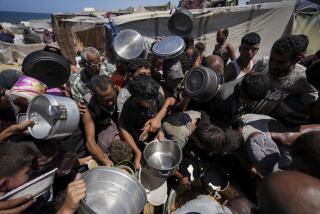Israel, Arabs Start Tough Talks on Future of Refugees : Mideast: Two sides disagree on number of Palestinians displaced by war. They also differ on how fast to repatriate them.
AMMAN, Jordan — Israel opened tense talks Tuesday with the Palestinians, Jordanians and Egyptians on allowing at least some of the 200,000 Palestinians who fled the West Bank and Gaza Strip during the 1967 Middle East War to go home.
“It was tough,” Marwan Mouasher, Jordan’s newly appointed ambassador to Israel, said after the discussions ended.
Israel agreed in the 1978 Camp David accords on the principle of allowing refugees from the 1967 war to return. But this was the first time that the Israelis have sat down for substantive talks on the issue with the parties involved.
Negotiators made little progress in their first, daylong session. But they decided to set up a committee that will meet every three weeks to decide who qualify as “displaced persons” from that war and how quickly they may return. The delegates also decided that foreign ministers will meet every two to three months to review the committee’s progress.
The return of Palestinians dislodged by Arab-Israeli wars is one of the most emotional issues of the Israeli-Palestinian peace talks.
Palestinians displaced by the 1967 war account for about one-third of all refugees, with the majority having fled during the 1948 Arab-Israeli War.
The fate of the 1948 refugees is not to be discussed until Israel and the Palestinians begin talks on the final status of the West Bank and Gaza Strip in 1996.
As expected, the opening positions of Israel and the Arabs were far apart Tuesday. The Israelis put the number of displaced persons at about 200,000. The Palestinians, Jordanians and Egyptians insist that there are as many as 1 million. The Israelis also insist that repatriation of those who left in 1967, when it occurs, will be a humanitarian gesture and will take place in phases over an as-yet-unspecified period of years.
The Palestinians, backed by the Jordanians and the Egyptians, argue that repatriation is a right anchored in international law and that it should take place as quickly as possible.
Palestinian negotiator Nabil Shaath expressed disappointment over Israel’s refusal to make a symbolic gesture and allow a small number of the 1967 refugees to return immediately. He said that peace negotiations between Israel and the Palestinians are in a state of “paralysis.” Only a dramatic gesture will convince people that reality is changing in the Middle East, Shaath said.
Shaath said that Foreign Minister Shimon Peres, head of Israel’s delegation, had refused his request to let 100 Palestinian families cross the Jordan River immediately from Jordan to return to the West Bank. Peres confirmed his refusal in a briefing to Israeli reporters after the meeting. “I didn’t come here as Uncle Sam to give out gifts,” he said.
But Peres did agree to discuss unspecified confidence-building measures in future meetings.
Fifteen miles north of Amman, the people most directly affected by Tuesday’s talks seemed oblivious to the event. The sometimes testy diplomatic negotiations in a sumptuously appointed palace might as well have been taking place on another planet, for all they meant to Sabha dar Abdel Khalim Awajeneh, 57.
Since 1967, Awajeneh has lived in Baqa camp, which, with 100,000 residents, is the largest such facility in the Middle East.
Jordan and the United Nations threw up Baqa as an emergency camp on 45 leased farm acres after Jordan lost the West Bank and East Jerusalem to Israel in the war. It was a time when the kingdom seemed in danger of collapsing from the flood of Palestinians streaming over the Jordan River.
“We didn’t even lock the door,” Awajeneh recalled of the day she and her family fled the West Bank town of Jericho on the first day of the war. “We took nothing, because we thought we would be back in a few days.”
She has not seen her farm since.
Would she return to Jericho? “God willing,” Awajeneh said. “I want to go, at least to visit, to see the house and the land.”
But her children, she said, cannot even imagine living in Jericho. “They were born here. This is all they have ever known.”
More to Read
Sign up for Essential California
The most important California stories and recommendations in your inbox every morning.
You may occasionally receive promotional content from the Los Angeles Times.










